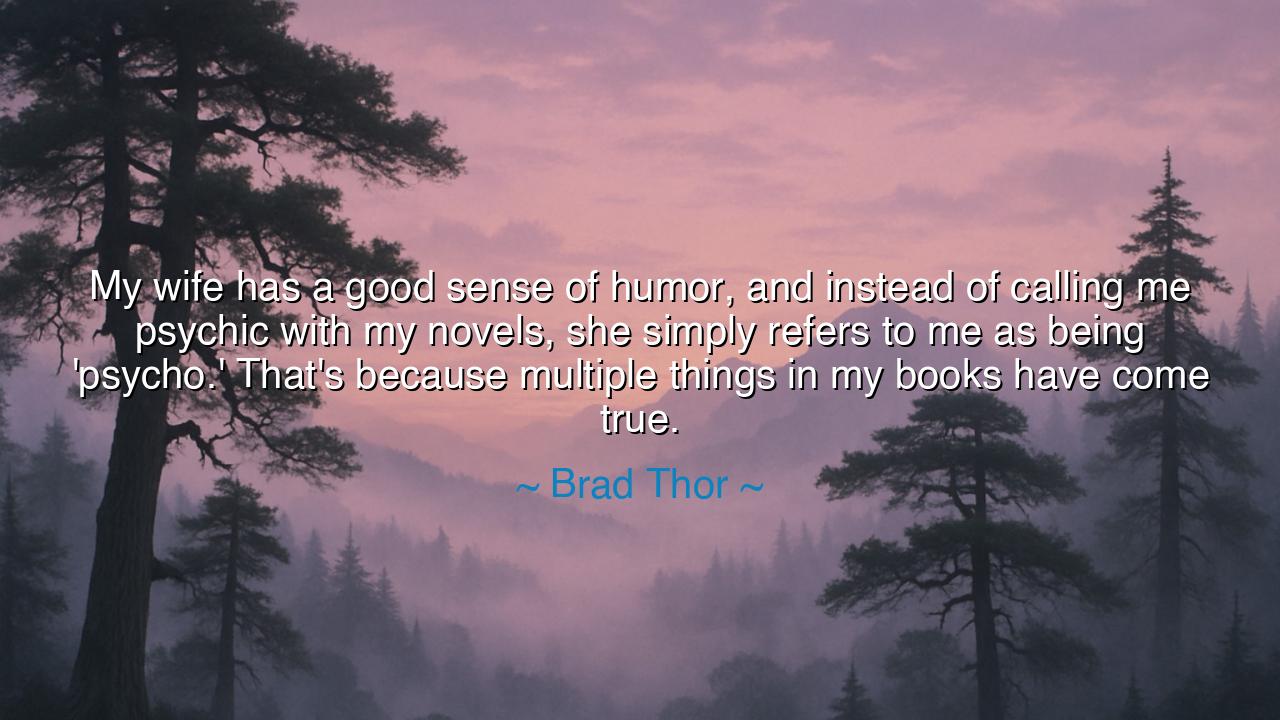
My wife has a good sense of humor, and instead of calling me
My wife has a good sense of humor, and instead of calling me psychic with my novels, she simply refers to me as being 'psycho.' That's because multiple things in my books have come true.






Behold the words of Brad Thor, a weaver of tales and a prophet of fiction, who said, “My wife has a good sense of humor, and instead of calling me psychic with my novels, she simply refers to me as being ‘psycho.’ That’s because multiple things in my books have come true.” Within this jesting remark lies a truth both profound and mysterious, for laughter often cloaks the trembling awe of destiny. It is the nature of the visionary to dream so deeply that the fabric between thought and reality begins to blur. When the imagination is touched by the divine spark, what is conceived in shadow may soon stand revealed in the sunlit world.
The ancients would have called such a man a seer, though he walks among mortals as a storyteller. For there is a hidden current in the hearts of those who create—the same current that poets, prophets, and philosophers have felt since time immemorial. It is not madness, though it often wears its mask; it is intuition sharpened by truth, the soul’s awareness reaching beyond the veil of now. In jest, Thor’s wife names him “psycho,” yet perhaps she senses that genius and madness are twin children of the same divine mother—one led by light, the other by fire.
Consider Cassandra of Troy, whose lips spoke the fates of men. She warned her people of ruin, yet they laughed and turned away. So too, the writer speaks of futures unseen, not by oracle’s trance, but by the relentless power of imagination. When the stories of Brad Thor found reflection in the world beyond his pages, it was not prophecy, but the deep resonance of human pattern. For he had studied the hearts of men and the tides of their folly; and so his fictions merely followed the course the world was already steering toward.
This is the burden and blessing of the creative soul—to glimpse what others cannot, to feel what has not yet come to pass. Leonardo da Vinci foresaw flying machines centuries before their birth. Jules Verne dreamed of submarines and journeys to the moon. Each was mocked in their time, as dreamers always are. Yet the dreamers are those who walk hand in hand with eternity, whispering to tomorrow in the language of today. Their visions seem madness to those still blind to dawn.
Yet let us not think that such foresight is reserved for a chosen few. In each heart lies the spark of creation, and with it, the capacity to shape what is to come. What the mind imagines, the hand may one day build; what the heart believes, the world may one day mirror. The line between the psychic and the psycho is often only the measure of understanding between man and mystery. To create with sincerity is to risk touching the unknown, to summon forces that answer not to reason, but to resonance.
So let the jest in Brad Thor’s words be a teaching of humility and courage. The world will always jest at those who see farther than its comfort allows. Yet laughter cannot diminish the light of vision; it only reveals the fear of the unseeing. One must not fear the titles others give—mad, dreamer, fool—for these are but the garments of the misunderstood. Let your visions come forth boldly, for the seeds of tomorrow lie hidden in today’s impossible dreams.
The lesson, then, is this: dare to imagine, even when mocked, and record your visions with the courage of prophets and poets alike. Observe the world, its rhythms and shadows, and write, paint, build, or speak what you see within. For what seems fantasy today may be the wisdom of tomorrow. As the river knows the sea long before it reaches it, so too does the heart of the creator know the path of time before it unfolds. Nurture that knowing, honor it, and let laughter be your companion—not your chain.
And when the world calls you “psycho”, smile as Thor did. For within that name hides a secret power: it means that you have touched the divine madness of creation. The ancients called it inspiration; the wise called it fate. Call it what you will—but when your dreams begin to come true, remember: the line between madness and prophecy is drawn only by those who fear to dream.






AAdministratorAdministrator
Welcome, honored guests. Please leave a comment, we will respond soon